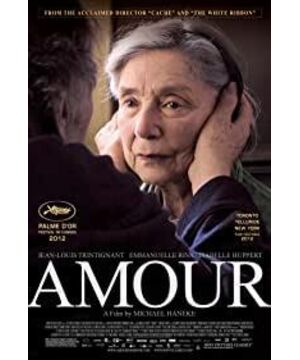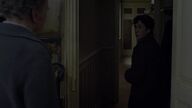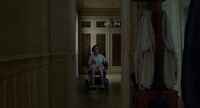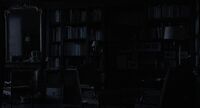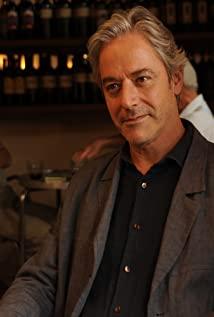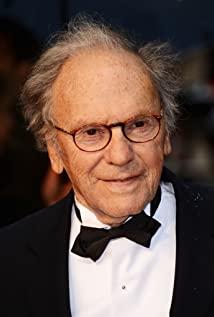The day before, Emma, still a graceful old man, went to the concert hall in a coat with her husband George, applauding restrainedly, discussing art in earnest, and casually talking about home life. The next day, everything changed. Emma's brain short-circuited in an instant. A thrombus in the carotid artery heralds a doomed fate. Half of her body was paralyzed.
This is where the story begins. The torture is like a volume that is gradually being pushed up, bit by bit, with its own rhythm, slowly destroying Emma's body and mind and her husband George's hopes.
Almost all the scenes in the movie "Love" take place in that huge and dull mansion, in which the couple lived their whole lives, and there are calm details everywhere, a kitchen piled with utensils, a living room full of books, The wall of the photo frame, all this is evidence of mutual support and also reveals the atmosphere of decay. Director Michael Haneke almost turned the house into a prison, and Emma and George were trapped in it. George stood at the window smoking a cigarette, his wife's pained groans and cries for help were like an invisible rope tied to him, only a dove flew in and out of the open window, a symbol of freedom, against the backdrop of being trapped in The old man in the mansion.
Emma can no longer walk gracefully, and as a piano teacher, playing the piano is an extravagant hope. But she still has a fighting attitude. She eats with her left hand, insists on reading by herself, and is happy to talk about her horoscope. In this way, she competes for the dignity that is slowly losing. Dignity is almost the hidden theme of this film, and it becomes the truth that the two old men must face at the end of their lives together with love and death. These grand words were originally only provided for abstract description and expression, but at this time they have become the most real details in life.
They hardly talk about music and art anymore, they talk about a friend's funeral, discuss the solemnity and absurdity of the ceremony, as if talking about their own impending doom. Emma controls her electric wheelchair in the hallway, like a child getting a new toy or a young man test-driving a brand-new car, once again in the midst of her illness, she maintains her remaining dignity and a sense of uneasiness. Such a horrible way to live with life. But it's all too fragile and quickly broken. The student who has become a pianist came to visit, and then sent a letter, he wished the two old people's lives to get back on track, this kind blessing, to Emma sounded like a vicious sentence, that his life has been Deviating from the norm, not to mention the compassion that was desperately concealed in the letter.
Everything continued to decay, quickly and decisively. If Emma was still trying to maintain the dignity of life before that, then after losing her language function and self-care ability at this time, her heart toward death is also an expression of dignity.
This is not a new subject for movies. What's important is that director Michael Haneke never wanted to dramatize such a scene, he didn't add to the drama and refused to let George as husband struggle. He collages scenes of life with a slow and calm perspective, almost deadly. George served his wife with resignation as if it would go on forever. But Michael Haneke ended it all. George sat on the edge of the bed lingeringly comforting his wife who was crying in pain. The wife gradually calmed down. He should have been relieved, but the old man took out the pillow and pressed it on Emma's face resolutely. , without hesitation, without remorse. Then he calmly faced the end of his own making, he bought flowers, trimmed them a little, and scattered the petals around his wife's stiff body...
It's a story with a brutal undertone and extreme ending, but director Michael Haneke narrates it slowly, anti-climax, rejecting any ups and downs. This seems to be what life should be like. There is no foreshadowing and struggle, no plans and steps. When there is no warning, everything suddenly comes, just like the disease once suddenly fell on Emma's head, and so does death. George gave his wife meticulous care, it was a strong love, and eventually he killed his wife, also out of strong love, but this choice leaked the coldness of death. But that might be the only option that isn't so bad. The love at this time was so heavy and cold. When the struggle and departure of a loved one must be chosen, will love and death become one?
View more about Amour reviews


